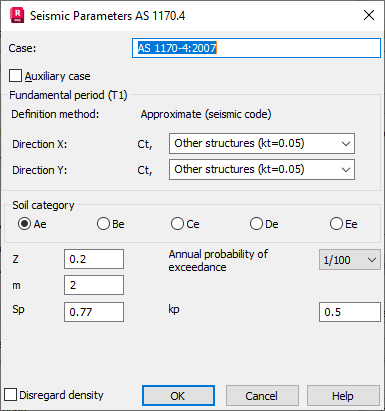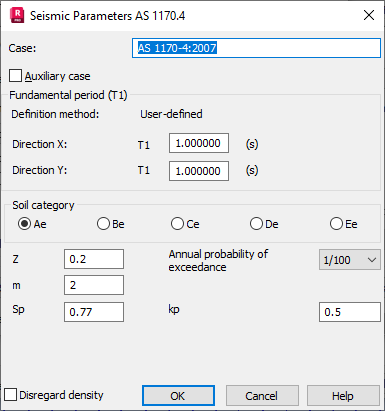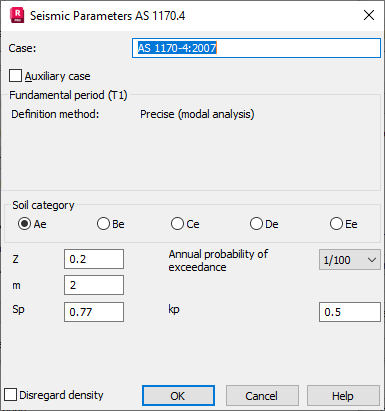Parameters of the seismic simplified analysis according to the equivalent lateral force method depend on a seismic code and a method of defining values of the fundamental periods selected in the Seismic Analysis dialog.
Approximate method

The fundamental period T1 is calculated according to the equation 6.2(7):
T1 = 1.25 * kt * hn 0.75
where:
kt = factor for determining building period (given by the code)
h - structure height (m), defined by difference between Structure range and Reference level
User-defined method

Only T1 on both directions is to be defined.
Precise method

According to this method you can calculate the exact value for both X and Y directions. If the option Periods with maximal mass participation is off in the Seismic Analysis dialog, the first mode in direction where more masses is active. If this option is on, one of modes, which fulfill limitations and most masses is active in the direction.
Code parameters
- Soil category as defined in Clauses 4.1
- Values of the coefficients: Z (hazard factor) Table 3.2, μ (structural ductility factor) and Sp (structural performance factor) as given in Clause 6.5
- Annual probability of exceedance and the kp coefficient (probability factor), Table 3.1
Base shear
Base shear force is calculated according to the formula:
V = [kp*Z*Ch(T1)*Sp/μ]/W t (eq. 6.2(3))
Where:
Kp is a probability factor (table 3.1) that depends on annual probability of exceedance (P).
Z is a hazard factor and it is taken from table 3.2
Ch(T1) is calculated on basis of Table 6.4
μ and Sp are the values from table 6.5.
Wt is the structure weight.
Distribution of base shear force is performed according to the formula:
Fx = V * Wi * hk i / (Σ Wi * hk i) (eq. 6.3(2))
i=1..storeysCount
Wi and Wj - floor weight
h - height from base level to appropriate floor level
V is Base Shear force
k - exponent depending on period value:
| Period (T1) | k |
|---|---|
|
< 0,5 sec |
1 |
|
0,5 - 2,5 sec |
Linear interpolation |
|
> 2,5 sec |
2 |
Disregard density
Excludes the density of the structure element (ρ=0) during the estimation of effective seismic weight applied to the stories of the structural model during analysis.